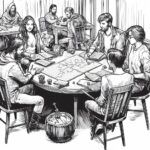
Thieves are sneaky and clever characters who use their skills to move around quietly and catch others off guard. They try to avoid fighting face-to-face and instead use their special abilities to overcome challenges. Every thief is unique, with their special talents and areas of expertise. Some are experts at picking locks and disarming traps, while others are great at tricking their enemies or finding hidden treasure.
A skilled thief can use their abilities to overcome almost any obstacle, whether it’s a locked door, a deadly trap, or a powerful magic spell. They are very versatile and can adapt to many different situations. With their wits and quick reflexes, a thief can outsmart even the toughest opponents and claim their treasure. Whether they are working alone or as part of a team, thieves are always on the lookout for their next big score.
Ability Focus: Dexterity
Hit Points: d6
Ancestries Allowed: Catfolk, Dwarf, Elf, Halfling, Human and Ratling
Starting Reputation: -1
Restrictions: Thieves can only wear leather armor and can only use weapons 3 lbs and lighter
Starting Equipment
A backpack, a bedroll, a belt pouch, caltrops, chalk (10), a flint and steel, a grappling hook, an iron pot, a mess kit, a mirror, pitons (10), rope, soap, thieves’ tools, torches (10), trail rations (5 days), and a water skin.
Starting Money
All characters start with 2d4 x 10 gold pieces
Special. Thieves have the Backstab ability (see the combat section) with a multiplier of 1/2 their level rounded up. Minimum multiplier is 2x. Halflings get a +1 to their multiplier.
Thief Skills
As a thief, the player has access to specialized skills that can be improved by distributing +3 points to the skills of their choosing at each level. The skills include Pick Locks, Search, Disable Traps, Climb, Stealth, Pick Pockets, Listen, and Read Languages. For example, a thief with a +2 in Intelligence would have a base Pick Locks bonus of 5.
- Pick Locks (Intelligence +3): Thieves are skilled in picking locks, using lock picks or other tools to manipulate the mechanisms and open locked doors, chests, and other containers. This skill requires a thieve’s tool kit.
- Search (Wisdom +1): Thieves have a keen eye for detail and can search an area for hidden objects or secret doors. They can also search for traps or other hazards.
- Disable Traps (Intelligence +1): Thieves can use their knowledge of traps and mechanisms to disarm or bypass them, preventing harm to themselves or their allies.
- Climb (Dexterity +5): Thieves can climb walls, cliffs, and other obstacles, using their strength and agility to scale heights that others might find insurmountable.
- Stealth (Wisdom +2): Thieves are skilled in moving quietly and remaining unnoticed, making it easier to sneak past guards or avoid detection in other situations.
- Pick Pockets (Dexterity +3): Thieves are skilled in picking pockets and stealing items from unsuspecting victims. They may also plant items on others, framing them for theft.
- Listen (Wisdom +3): Thieves have a keen sense of hearing and can listen for distant sounds, such as the approach of guards or the creaking of a hidden door.
- Read Languages (Intelligence): Thieves can read and decipher various languages, including ancient scripts or magical runes, allowing them to interpret maps, scrolls, and other written materials.
Using Thief Skills
To use these skills in the game, the player would need to describe their character’s actions to the Dungeon Master and roll a 20-sided die, adding any modifiers from their relevant ability score, such as Dexterity for Pick Locks or Climb. The result of the roll would determine whether the player was successful in their attempt. For example, if the player wanted to pick a lock, they would roll a 20-sided die and add their Dexterity modifier to the roll. If the result was higher than the DC (difficulty class) set by the DM, they would successfully pick the lock.
Each skill has its own specific use and could be used in various situations during the game. For example, the Search skill could be used to find hidden doors or secret passages, while the Pick Pockets skill could be used to steal small items from NPCs. By improving their skills over time, the thief can become a master of their craft and gain an advantage in various scenarios, such as disarming traps or sneaking past guards undetected.
NOTE: Each skill may only be attempted one time, and the character cannot try again until gaining a level of experience.
Picking Locks may only be tried once per lock, and only if “Thieve’s Tools” are carried.
Searching may only be tried once per situation.
Disabling Traps my only be attempted if a trap is found in a search.
Picking Pockets may be risky. If the DM rolls a number greater than twice the given chance for success, the thief is not only seen by those nearby, but is caught in the act by the intended victim, who may (and often does) react unfavorably.
Stealth rolls will always seem successful to the thief. The GM will roll in secret to see if the monsters or NPCs are fooled. Stealth may one be used if the thief is not engaged with those they are hiding from.
At Level 2 (2,000+ Experience Points)
Gain hit points by rolling 1d6 + Constitution and adding it to your total hit points
Level up any of your Thief Skills by distributing 3 skill points
At Level 3 (4,000+ Experience Points)
Gain hit points by rolling 1d6 + Constitution and adding it to your total hit points
Level up any of your Thief Skills by distributing 3 skill points
Increase Ability Focus to 2
At Level 4 (8,000+ Experience Points)
Gain hit points by rolling 1d6 + Constitution and adding it to your total hit points
Level up any of your Thief Skills by distributing 3 skill points
This Post Has 4 Comments
Leave a Reply
You must be logged in to post a comment.





Does the Ability Focus apply on the thief skills (so for example Climb at level 1 is 12+Ability Focus vs. DC)?
And what about the same skills (for example Stealth) for non-thieves?
Thank you very much!
Skill bonuses are used INSTEAD of ability bonuses
For the Thief Skills, it says that at each level the thief gains +3 points to distribute to their skills as they’d like. There is also a number in parentheses next to each thief skill (like Climb, which has +12). Is this what the skills start at at level 1 with none of the points distributed? So, at level 1, they’d have all of those bonuses to all of those rolls, and be able to assign an additional +3? I’m not sure if I understand this 100% correctly. Thanks for taking the time if you answer!
Matt – Yes, the number in parentheses is the starting number. So at level one they would start with the base number, at level two add the +3 as needed. If your DM allows, you can add the +3 at level one too.